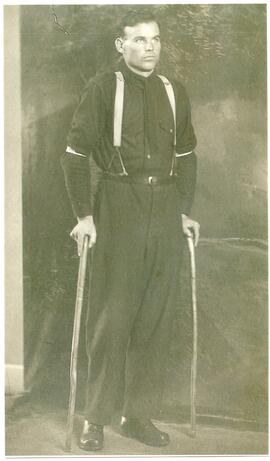Kost’ Telychko was born in Ohiltsi village, Kharkiv region on May 27, 1907 to the family of Mykhailo and Tetiana Telychko (nee Tymchenko). In 1927 he graduated from the Institute of National Economy. In 1931, he was imprisoned, after getting out of jail, he managed to build a successful career.
By the end of WWII, Telychko lived in Austria, working on construction and Austrian farms. In 1945 he moved to Germany and lived first in Karsfeld DP camp; when the camp was closed in spring 1946, he moved to Mittenwald DP camp, Germany. While in Karsfeld, Telychko became a secretary of the newly founded Ukrainian National State Union organization (Український Нац. Державний Союз). After relocating to the Mittenwald camp, Telychko was elected as the organization's head and participated in all its conventions in 1946, 1947 and 1949.
Telychko arrived in Canada on June 10, 1949, and settled in Edmonton. The same year he became a Ukrainian Greek Orthodox Church member. In September 1949, he also joined the Edmonton division of the Ukrainian Canadian Congress and remained its member for 22 years. He was also a member of the Ukrainian Self-Reliance Association where in 1950 he served as elected secretary. Telychko worked towards the founding of the Committee for the Ukrainian National Council (Комітет Сприяння Українській Народній Раді), was its secretary for many years and, later, the head of the initiative.
On November 1956 Telychko initiated a radio broadcasts in Edmonton. By 1982 over 381 programs were aired through the CKUA Radio Network. Majority of the programs were written by Kost' Telychko.
He often was elected a convention delegate. On July 6, 1960, he delivered a main speech at the USRL/CYC Convention in Toronto. In the 1970s and 1980s, he also worked as an advisor and journalist, taught at the Ukrainian Saturday school (Рідна школа), was an author of radio broadcasts and newspaper articles. Kost’ Telychko was awarded the Shevchenko medal and many scrolls of honour. He died on April 23, 1999, in Edmonton, Alberta.
